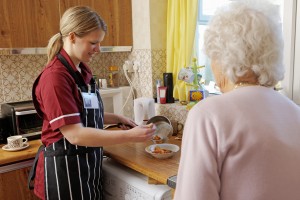One of the big concerns that family caregivers have is whether their mom or dad is getting enough to eat. There are some natural changes that take place as we age, and one of them is often a diminished appetite. However, just because someone doesn’t feel hungry doesn’t mean that they don’t need to eat. Even if caloric requirements are lowered in many older individuals, your elderly loved one still might not be getting enough food.
Age related weight loss is a common issue amongst many elderly individuals, and it can sometimes even result in bone and muscle atrophy. This leads to a whole host of other health issues, such as a severe injury if a fall occurs. Muscles serve to not only provide strength, but also to help with balance and protection. If they begin to waste away because they aren’t getting enough fuel sent to them, these things cannot happen. Proper nutrition can help improve health and even prevent injuries in some cases.
If you’re a caregiver that helps with a loved one, you might have come up with a few tricks of your own to help ensure that your mom or dad is eating well and eating enough. If not, here are a couple of our favorites:
Prepare meals ahead of time. Cooking can be time consuming, and if you’re caring for another person and preparing all of their meals for them, you might find yourself spending more time fixing meals for them than you are actually spending time giving them company. This can be frustrating, and to alleviate the problem, you can prepare meals in batches. For example, if you are making dinner, make twice as much as you normally would and freeze half of it. You can reheat it and have it as a lunch next week. One meal down.
Help your parent stay active. One of the reasons that appetite decreases with age is because people are not as physically active as they used to be. When you’re active, you burn more calories, and your body naturally craves food to make up for it. A sedentary life leads to less of a need for calories, and less of a desire to eat. By helping your parent exercise a bit, you can help them to boost their metabolism and appetite, and strengthen their muscles a bit. This helps improve several aspects of their health at once.
Having a professional in-home care service working with your family can help prevent issues when it comes to meals. Trained caregivers can help prepare meals for your parent while you are away during the day and encourage them to eat. One of the perks of having a caregiver assisting is that they will be more likely to encourage your parent to eat healthier food. When appetite begins to disappear, it can be very tempting to go with something quick, easy, and unhealthy to eat. When a caregiver is assisting, nutritious food can be prepared, eliminating that temptation to eat something unhealthy.



Leave a Reply